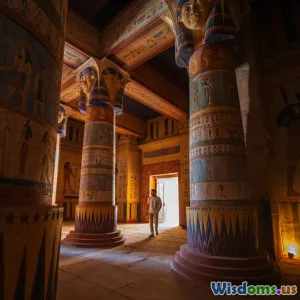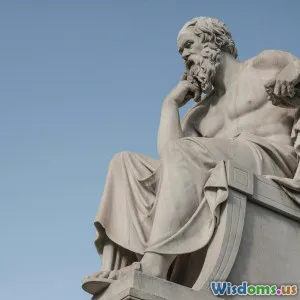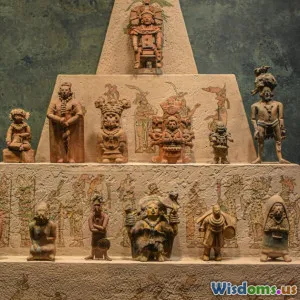
The Influence of Ancient Cultures
7 min read Explore how ancient cultures shaped modern society, from language and architecture to philosophy and science. (0 Reviews)
The Influence of Ancient Cultures: Bridges Between Past and Present
Introduction
Imagine walking through your city and unknowingly stepping on centuries of history layered beneath your feet. From the buildings we live in to the ideas shaping our thoughts, ancient cultures have left an indelible mark on our modern world. But how deep does this influence run? Examining the lasting contributions of ancient civilizations reveals not only fascinating archaeological mysteries but also timeless legacies that continue to inform art, governance, science, and philosophy today.
Defining the Foundations: What Do We Mean by Ancient Cultures?
Ancient cultures refer to the civilizations from the dawn of human societal development, typically before the Middle Ages. This includes renowned groups such as the Egyptians, Mesopotamians, Greeks, Romans, Mayans, Indus Valley inhabitants, and the Chinese dynasties, among others. These peoples constructed complex cities, developed writing and legal systems, and experimented with technologies that paved the road to modernity.
Language and Writing Systems: The Birth of Communication
One of the most significant contributions is the development of written language. The Sumerians formulated cuneiform around 3200 BCE—the earliest known writing system—enabling record-keeping and literature that detailed laws, trade, and religious rituals. Similarly, Egyptian hieroglyphs preserved spiritual beliefs and historical events in vivid form.
These early writing systems laid the groundwork for alphabetic scripts, such as the Phoenician alphabet which profoundly influenced Greek and Latin alphabets. According to linguist Jean-Paul Roux, “Our very ability to communicate abstract ideas vividly rests on the shoulders of these ancient scribes.”
Architectural Marvels: Engineering Timeless Wonders
Ancient architects demonstrated astonishing creativity and technical mastery. The pyramids of Giza, built around 2600 BCE, showcase brilliant alignment with celestial bodies, reflecting the Egyptians’ sophisticated astronomical knowledge. The Roman Empire, meanwhile, pioneered the use of concrete and developed extensive aqueduct systems, some of which remain operational today.
Not just monuments, but urban design owes much to ancient civilizations. The Indus Valley cities like Mohenjo-Daro exhibited advanced urban planning with grid layouts, drainage systems, and standardized bricks, highlighting an emphasis on civic welfare.
Philosophical and Political Legacies: Foundations of Modern Thought
Philosophy’s roots trace back largely to ancient Greece. Thinkers such as Socrates, Plato, and Aristotle questioned existence, ethics, and governance—their works shaping Western intellectual traditions. Plato’s Republic introduced ideas on justice and the ideal state, directly influencing contemporary political philosophy.
From the East, Confucianism emerged as a guiding doctrine for social harmony and governance, deeply affecting countries like China, Korea, and Japan for millennia. Confucius emphasized morality, familial piety, and cultural rituals that continue to impact ethical structures worldwide.
Scientific Innovations: Seeds of Modern Knowledge
Ancient cultures pioneered fields like mathematics, medicine, and astronomy. The Babylonians developed early algebraic concepts and a base-60 number system still reflected in how we measure time (60 seconds/minute).
The ancient Egyptians applied practical medical treatments documented on papyrus scrolls; their surgical methods influenced later Greek and Roman medicine. Additionally, the Mayans created exceptionally accurate calendars grounded in astronomical observation, illustrating humanity’s desire to understand natural cycles.
Cultural Exchange and Syncretism: An Ancient Globalization
Trade routes such as the Silk Road facilitated not only goods exchange but also the transmission of ideas, religions, and technologies. Buddhism, originating in India, spread throughout Asia influencing cultures far beyond its birthplace.
The blending of Hellenistic and Eastern motifs following Alexander the Great's conquests created new artistic and philosophical syntheses that exemplify early cultural globalization.
Lessons from Archaeological Mysteries
Archaeology continues to uncover enigmatic aspects of ancient cultures challenging established histories. For example, the purpose of the Nazca Lines in Peru remains partially speculative—some theories propose astronomical calendars while others suggest a ritualistic significance.
Decoding these mysteries offers deeper insights into human creativity, societal priorities, and environmental interactions in ancient times, emphasizing the complexity often underestimated by modern perspectives.
Conclusion
The influence of ancient cultures is a profound testament to human ingenuity and resilience across time. Through language, architecture, philosophy, science, and cultural exchange, they have bequeathed a heritage that is the foundation of present-day civilization. Engaging with these ancient stories not only enriches our historical understanding but also inspires us to appreciate and preserve the enduring legacies shaping our world.
In an era of rapid technological change, looking back at these time-tested contributions helps ground us in the continuity of human endeavor and innovation. It invites us to ponder: How will today’s cultures imprint on distant futures? Like our ancestors, perhaps the key lies in curiosity, creativity, and a commitment to shared knowledge.
“What we have once enjoyed deeply we can never lose. All that we love deeply becomes a part of us.” — Helen Keller
Rate the Post
User Reviews
Other posts in Cultural Studies
Popular Posts


















